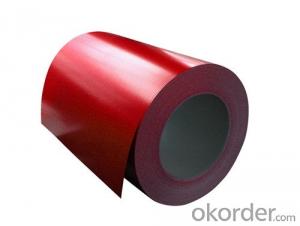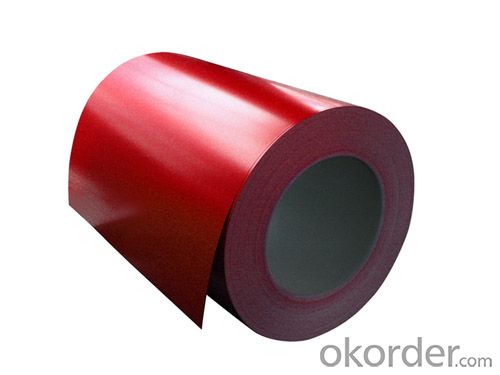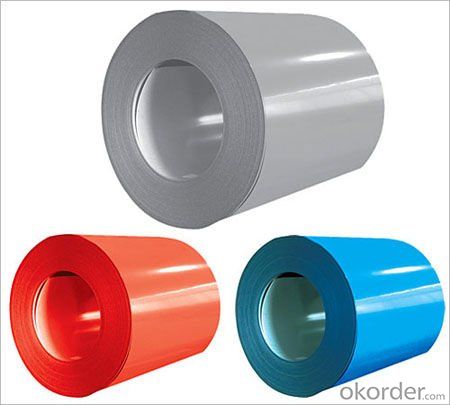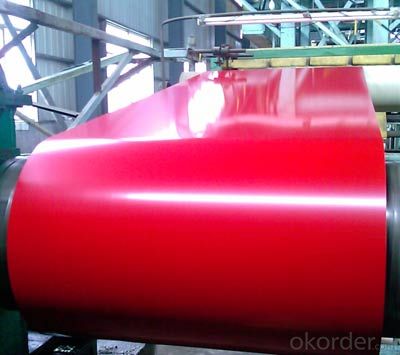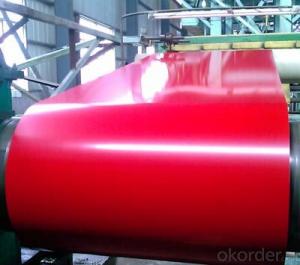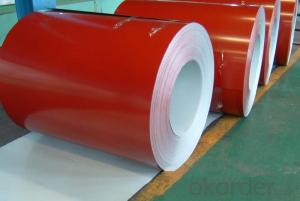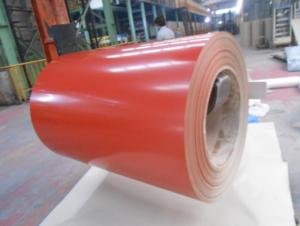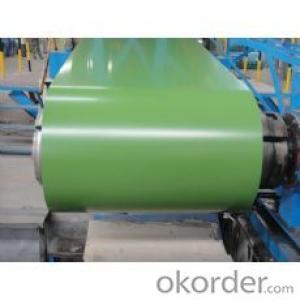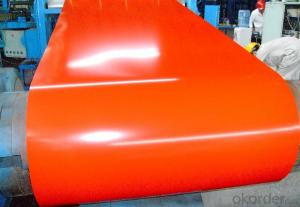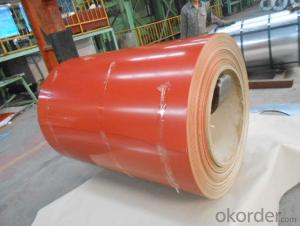Pre-Painted Galvanized/Aluzinc Steel Sheet in Coils Red Color
- Loading Port:
- Shanghai
- Payment Terms:
- TT OR LC
- Min Order Qty:
- 100 m.t.
- Supply Capability:
- 10000 m.t./month
OKorder Service Pledge
OKorder Financial Service
You Might Also Like
1. Pre-Painted Galvanized/Aluzinc Steel Coil Description:
With GI as base material, after pretreatment (degrease and chemical treatment ) and liquid dope with several layers of color, then after firing and cooling, finally the plate steel is called pre-painted galvanized (aluzinc) steel. Pre-painted galvanized steel is good capable of decoration, molding, corrosion resistance. It generally displays superior workability, durability and weather resistance.
2.Main Features of the Pre-Painted Galvanized/Aluzinc Steel Coil:
• Excellent process capability
• Smooth and flat surface
• Workability, durability
• Excellent heat resistance performance
• High strength
• Good formability
• Good visual effect
3.Pre-Painted Galvanized/Aluzinc Steel Coil Images
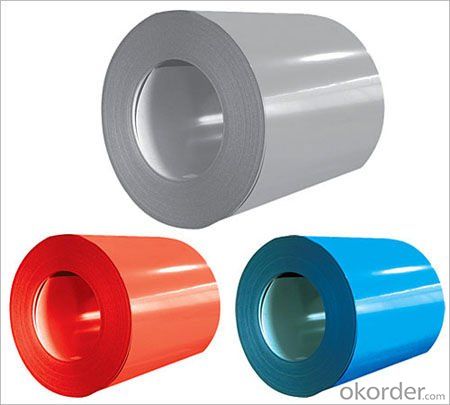
4.Pre-Painted Galvanized/Aluzinc Steel Coil Specification
Standard: AISI, ASTM, BS, DIN, GB, JIS
Grade: DX51D, DX52D
Thickness: 0.17-2.0mm
Brand Name: KMRLON
Model Number: coil
Type: Steel Coil
Technique: Cold Rolled
Surface Treatment: Coated
Application: Boiler Plate
Special Use: High-strength Steel Plate
Width: 20-1250mm
Length: customized
commoidty: pre-painted galvanized steel coil
Thickness: 0.13-4.0mm
width: 20-1250mm
zinc coating: 40-180g/m2
printing thickness: top side: 20+/-5 microns, back side: 5-7 microns
color: RED color
surface treatment: color coated
coil weight: 4-7 tons
coil ID: 508/610mm
packaging: standard seaworthy packing
5.FAQ of Pre-Painted Galvanized/Aluzinc Steel Coil
1. What’s the application of this product?
Roof, roof structure, surface sheet of balcony, frame of window, etc.
2. What’s the brand of the paint?
We use the best brand of all of the word—AKZO.
3. How about your company?
A world class manufacturer & supplier of castings forging in carbon steel and alloy steel,is one of the large-scale professional investment casting production bases in China,consisting of both casting foundry forging and machining factory. Annually more than 8000 tons Precision casting and forging parts are exported to markets in Europe,America and Japan. OEM casting and forging service available according to customer’s requirements.
4. How to guarantee the quality of the products?
We have established the international advanced quality management system,every link from raw material to final product we have strict quality test;We resolutely put an end to unqualified products flowing into the market. At the same time, we will provide necessary follow-up service assurance.
5. How long can we receive the product after purchase?
Usually within thirty working days after receiving buyer’s advance payment or LC. We will arrange the factory manufacturing as soon as possible. The cargo readiness usually takes 15-25 days, but the shipment will depend on the vessel situation.
- Q: How are steel coils used in the manufacturing of electrical transformers?
- Steel coils are used in the manufacturing of electrical transformers as they provide structural support and act as a core for the transformer. The steel coils are wound with copper wire to create the primary and secondary windings, which help in transferring electrical energy efficiently.
- Q: Measures to prevent cold rolling of packaged cold rolled steel coils? Who can give some professional opinions oh?
- Cold rolled steel coils are generally sprayed antirust oil, according to user requirements, light, medium, heavy oil 3 types. Nevertheless, if the oil is volatile or in a humid environment, the steel plate comes into contact with the water for a period of time, indicating that it is beginning to rust.
- Q: What are the environmental benefits of using steel coils?
- Using steel coils offers several environmental advantages. To begin with, steel is a highly recyclable material. Steel coils can be easily recycled and transformed into new steel products, reducing the necessity for mining and extracting raw materials. Recycling steel also consumes less energy than producing it from scratch, resulting in lower greenhouse gas emissions and a smaller carbon footprint. Moreover, steel is renowned for its durability and longevity. When employed in construction or manufacturing, steel coils can endure for decades without compromising their structural integrity. This reduces the need for frequent replacements, which, in turn, decreases resource consumption and the energy required for production. Additionally, steel exhibits exceptional resistance to corrosion and weathering, making it an ideal choice for outdoor applications. Its ability to withstand harsh environmental conditions means that steel coils can maintain their functionality for extended periods, reducing waste generation and the environmental impacts associated with replacing damaged or deteriorated materials. Lastly, steel is an adaptable material that finds utility in a wide range of industries and applications. Its versatility allows for efficient resource utilization, as steel coils can be easily adjusted and customized to meet specific project requirements. This adaptability also enables the use of steel in sustainable building designs, such as energy-efficient structures or green buildings that incorporate renewable energy systems. In conclusion, the use of steel coils brings about environmental benefits related to their recyclability, durability, resistance to corrosion, and versatility. Opting for steel coils in various applications contributes to resource conservation, reduced carbon emissions, and a more sustainable future.
- Q: You have two steel wool pads,one is cut up into little pieces, and the other is whole, and they are both submerged in water. 1.Which steel wool pad will rust quicker?2.How much faster will that pad rust? (estimate+explain the estimate)6.How could you make the steel wool pad rust faster?Please dont tell me to do my homework because I tried, but I bought the wrong type of steel wool
- How to make it rust faster ? Adding oxygen to the water - bubbling air through it. Raising the temperature should make the reaction go faster, but I believe it also reduces the amount of dissolved gas. Adding salt, or an ionic compound like an acid, will accelerate electrochemical corrosion. That usually requires a less active metal, like copper, in contact with the steel, but variations in the composition of the steel may be sufficient to promote corrosion.
- Q: How are steel coils used in the production of electrical conduits?
- Steel coils are used in the production of electrical conduits in several ways. Firstly, steel coils are used as the raw material for manufacturing electrical conduits. These coils are made of high-quality steel that is specially processed and formed into a long, continuous strip. Once the steel coils are obtained, they are fed into a machine called a slitter. The slitter cuts the coils into narrower strips of the desired width. These narrower strips will serve as the base material for the electrical conduits. The next step is to shape the steel strips into the desired conduit shape. This is done by passing the strips through a series of rollers and other shaping tools. The steel strips are gradually formed into the round or rectangular shape of the conduit. The rollers apply pressure and manipulate the steel strip until it reaches the desired shape. After the shaping process, the ends of the steel strips are welded together to create a continuous conduit. This welding process ensures that the conduit will have a seamless structure, which is important for its functionality and durability. Once the conduits are formed and welded, they undergo further processing to enhance their properties. This may include processes such as galvanizing, where the conduits are coated with a layer of zinc to protect them from corrosion. This additional layer provides the conduits with increased longevity, making them suitable for various electrical applications. In summary, steel coils are essential in the production of electrical conduits. The coils serve as the raw material that is shaped, welded, and processed to create the final product. The use of steel coils ensures that the electrical conduits are strong, durable, and capable of withstanding the demands of electrical installations.
- Q: What are the different types of steel coil treatments?
- There are several different types of steel coil treatments that are used to enhance the properties and performance of steel coils. These treatments include: 1. Annealing: Annealing is a heat treatment process that involves heating the steel coil to a specific temperature and then slowly cooling it. This treatment helps to relieve internal stresses, improve ductility, and increase the overall strength of the steel coil. 2. Pickling: Pickling is a chemical treatment that involves immersing the steel coil in a solution of acid or other chemicals to remove impurities, scale, and rust from the surface. This treatment helps to improve the surface finish and cleanliness of the steel coil. 3. Oil coating: Oil coating is a treatment that involves applying a thin layer of oil or other protective coating to the surface of the steel coil. This treatment helps to prevent corrosion, improve lubricity, and protect the steel coil during storage and transportation. 4. Galvanizing: Galvanizing is a process that involves coating the steel coil with a layer of zinc to protect it from corrosion. This treatment creates a barrier between the steel coil and the surrounding environment, ensuring long-term durability and resistance to rust. 5. Tempering: Tempering is a heat treatment process that involves heating the steel coil to a specific temperature and then rapidly cooling it. This treatment helps to improve the toughness and strength of the steel coil, making it more resistant to impact and deformation. These are just a few examples of the different types of steel coil treatments that are commonly used. Each treatment has its own specific purpose and benefits, and the choice of treatment will depend on the desired properties and application of the steel coil.
- Q: How are steel coils used in the production of automobile frames?
- Automobile frames rely heavily on steel coils, which are indispensable for their production. These coils, crafted from top-notch steel, undergo a process of uncoiling before being fed into a stamping press, where they assume various forms, constituting parts of the frame. The presence of steel coils is crucial as they furnish the frame with the requisite strength and rigidity, ensuring it can bear the vehicle's weight and maintain structural integrity. Once shaped, the coils are frequently welded together to construct the frame structure. This welding procedure securely binds the individual components, guaranteeing that the frame can endure the forces and strains encountered during the vehicle's operation. Utilizing steel coils in the production of automobile frames also allows for design flexibility, as they can be effortlessly shaped and manipulated to fulfill specific requirements. Moreover, steel coils possess exceptional durability and corrosion resistance, rendering them ideal for automotive applications. Frames fashioned from these coils are not only robust and dependable but also capable of withstanding harsh conditions and road vibrations. This not only enhances the vehicle's safety but also contributes to its longevity and overall performance. Steel coils also find use in other critical vehicle components, including suspension systems, chassis, and body panels. Their versatility, strength, and cost-effectiveness make them a favored choice in the automotive industry. Overall, the incorporation of steel coils in automobile frame production plays a significant role in guaranteeing the safety, durability, and performance of modern vehicles.
- Q: engineering sloutions related to steel fabrication
- not okorder /
- Q: What is the process of recycling steel coils?
- The process of recycling steel coils involves several steps. First, the steel coils are collected from various sources, such as manufacturing and construction sites. Next, the coils are transported to a recycling facility where they undergo a thorough inspection and sorting process. The coils are then cleaned to remove any contaminants or impurities. After cleaning, the steel coils are shredded into smaller pieces and melted down in a furnace. The molten steel is then molded into new coils or other steel products. Finally, the recycled steel coils are tested for quality and can be used in various industries, reducing the need for new steel production and minimizing waste.
- Q: Is a steel plate the same as a steel coil?
- Generally speaking, they can be used interchangeably, and the purchase price of the plate is slightly cheaper.
Send your message to us
Pre-Painted Galvanized/Aluzinc Steel Sheet in Coils Red Color
- Loading Port:
- Shanghai
- Payment Terms:
- TT OR LC
- Min Order Qty:
- 100 m.t.
- Supply Capability:
- 10000 m.t./month
OKorder Service Pledge
OKorder Financial Service
Similar products
Hot products
Hot Searches
Related keywords
